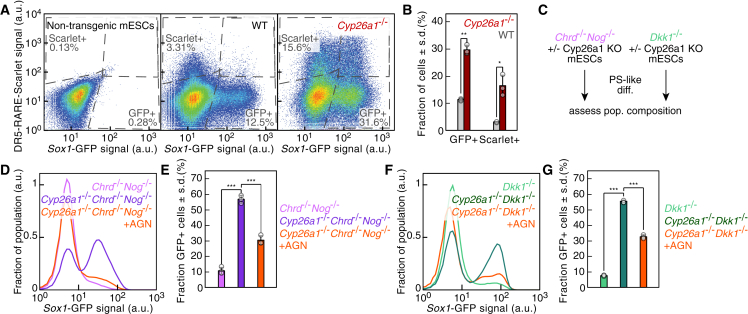Figure 6.
Cyp26a1 limits RA levels and neuroectoderm differentiation during PS-like differentiation
(A) Sox1-GFP and DR5-RARE-Scarlet reporter expression after PS-like differentiation of non-transgenic wild-type (WT) or Cyp26a1−/− mESCs. Dotted lines: gates fixed according to the non-transgenic mESCs negative control.
(B) Quantification of (A) data (n = 3 independent experiments; ∗∗, p < .01; ∗∗∗, p < .001; two-sided unpaired t test; data represented as mean ± SD).
(C) Scheme to assess the interplay between Cyp26a1-mediated dampening of RA signaling and TGFβ or Wnt signaling.
(D and E) Sox1-GFP reporter expression in Chrd−/−Nog−/− (pink) or Cyp26a1−/−Chrd−/−Nog−/− (purple, orange: AGN added after day 3) cells after PS-like differentiation (D) and quantification (E) (n = 3 independent experiments; ∗∗∗, p < .001; One-way ANOVA followed by Tukey's post hoc test; data represented as mean ± SD).
(F and G) Sox1-GFP reporter expression in Dkk1−/− (light green) or Cyp26a1−/−Dkk1−/− (dark green, orange: AGN added after day 3) cells after PS-like differentiation (F) and quantification (G) (n = 3 independent experiments; ∗∗∗, p < .001; one-way ANOVA followed by Tukey's post hoc test; data represented as mean ± SD). See also Figure S6.

